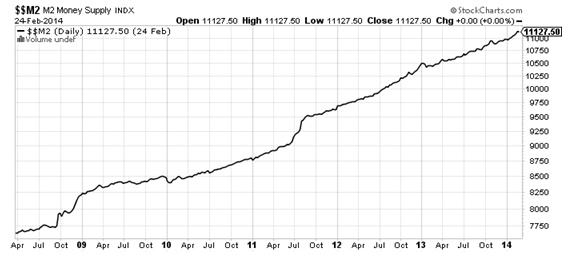The Bureau of Labor Statistics (BLS) reports inflation in the U.S. economy increased by 0.1% in February from the previous month. As usual, these numbers have again brought up the theory of deflation — a period when general prices decline.
Reasons For Deflation Fear?
In 2013, inflation for the entire year was 1.5%. In 2012, it was 1.9%. Going back further, in 2011, it was three percent. If we extrapolate the inflation numbers from January and February of this year and assume the increase will be the same (0.1%) throughout the year, we are looking at an inflation rate of 1.2% for 2014.
Wells Fargo Securities LLC. (NYSE:WFC) has gone one step further. Economists at the firm believe there’s a 66% chance that deflation in the U.S. economy will prevail and these chances have been increasing since 2010. (Source: Bloomberg, February 21, 2014.)
To me, that's sheer nonsense!
Food And Energy
The reality of the matter is that the inflation numbers reported by the BLS exclude changes in food and energy prices — the most important things consumers use on a daily basis. When you include food and energy, inflation is running at a much higher rate.
The prices of basic commodities are skyrocketing. Take corn prices, for example: since the beginning of the year, corn prices are up more than 15%. Wheat prices are up almost 20% year-to-date. When you look at meat prices, such as lean hogs, you will see they have increased by more than 45% since January.
As I see it, deflation is nothing but a farfetched idea for the U.S. economy. (In a recent survey we ran at Profit Confidential, the average estimate for current inflation from our readers was five percent.)
Why do I believe inflation will be the big problem for the U.S. economy and not deflation?
Below I present the M2 money stock. The M2 money stock is considered to be a broader measure of the money supply because it includes money on deposit in savings accounts, deposit accounts and non-institutional money market funds, in addition to the currency already in circulation.
Chart courtesy of www.StockCharts.com
Lots Of Money (Supply)
Since 2009, the money supply in the U.S. economy has increased by 35%. And the more money in circulation, the greater the chances of price inflation down the road.
The higher inflation goes, the higher interest rates will go to control it. The Federal Reserve, in its most recent economic projection, said it may increase the federal funds rate to one percent by 2015 and two percent by 2016 from the current 0.25%. I question if the Fed is seeing higher inflation ahead, but it’s just not talking about it.
If a higher inflation rate causes a hike in interest rates, we will see a significant amount of trouble for the housing market and the stock market in 2015 and 2016.
